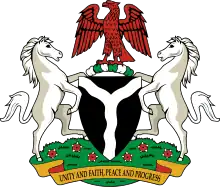Federal High Court of Nigeria
The Federal High Court of Nigeria (FHC) is one the Federal superior Courts of record in Nigeria. It has coordinate jurisdiction with the High Courts of the States of the Federation, including FCT and is located in Shehu Shagari Way, Central District Abuja.[1]
| Federal High Court of Nigeria | |
|---|---|
| Established | 1973 |
| Location | Shehu Shagari Way, Central District, Abuja, FCT, Nigeria |
| Composition method | Presidential nomination with Senate confirmation |
| Authorized by | Constitution of Nigeria |
| Judge term length | Life tenure with mandatory retirement at the age of 65. |
| Website | www |
 |
|---|
|
|
Overview
The Federal High Court was formerly called the Federal Revenue Court and was established by the Federal Revenue Act of 1973. However, by virtue of section 228(1) and 230 (2) of the 1979 Constitution of the Federal Republic of Nigeria, it was renamed, Federal High Court. The Federal High Court has both criminal and civil jurisdiction over matter instituted before it pursuant to section 251 of the 1999 Constitution of the Federal Republic of Nigeria (as amended).[2]
Structure and Organization
The Federal High Court is composed of the Chief Judge and such number of judges as may be prescribed by an Act of the National Assembly. Judges of the FHC are appointed by the President on the recommendation of the National Judicial Council, and subject to confirmation by the Senate. To qualify for the post of a Chief Judge or judges of the Federal High Court, such a person must have been qualified to practice law in Nigeria, and must have been so qualified for a period not less than ten years. The retirement age for Judges of the Federal High Court of Nigeria is 65 years.[3]
As at December, 2021, the total number of Federal High Court judges in the country stood at 75. Meanwhile, the total number of cases across the various judicial division was 128,000[4]
List of Judicial Divisions
Although, the court is headquartered in Federal Capital Territory, Abuja, it has several judicial divisions around the country.[5][6]
- Federal High Court, Abuja (Headquarters)
- Federal High Court, Abakaliki
- Federal High Court, Abeokuta
- Federal High Court, Akure
- Federal High Court, Ado- Ekiti
- Federal High Court, Awka
- Federal High Court, Asaba
- Federal High Court, Bauchi
- Federal High Court, Yenegao
- Federal High Court, Benin
- Federal High Court Calabar
- Federal High Court, Damaturu
- Federal High Court, Dutse
- Federal High Court, Enugu
- Federal High Court, Gombe
- Federal High Court, Ibadan
- Federal High Court, Ikeja
- Federal High Court, IIorin
- Federal High Court, Jos
- Federal High Court, Kaduna
- Federal High Court, Kano
- Federal High Court, Lafia
- Federal High Court, Lagos
- Federal High Court, Maiduguri
- Federal High Court, Markurdi
- Federal High Court, Minna
- Federal High Court, Oshogbo
- Federal High Court, Port Harcourt
- Federal High Court, Owerri
- Federal High Court, Sokoto
- Federal High Court, Umuahia
- Federal High Court, Warri
References
- "Nigeria | Standing International Forum of Commercial Courts". sifocc.org. Retrieved 2022-04-12.
- "OVERVIEW OF THE JURISDICTION OF THE FEDERAL HIGH COURT IN NIGERIA". Resolution law firm. 2021-02-20. Retrieved 2022-04-12.
- "NASS mulls extending retirement age of Supreme Court justices". The Guardian Nigeria News - Nigeria and World News. 2021-01-30. Retrieved 2022-04-12.
- "Federal High Court with 75 judges has 128,000 pending cases - Chief Judge | Premium Times Nigeria". 2021-12-17. Retrieved 2022-04-12.
- ":: About Federal High Court Nigeria ::". www.fhc-ng.com. Retrieved 2022-04-13.
- "List of Nigeria Federal High Court Divisions Headquarters - Finelib.com". www.finelib.com. Retrieved 2022-04-13.